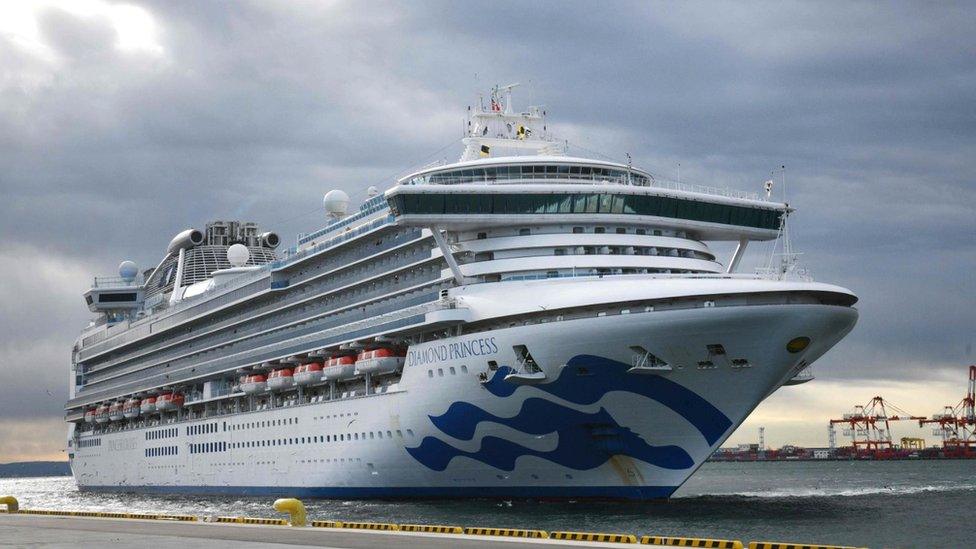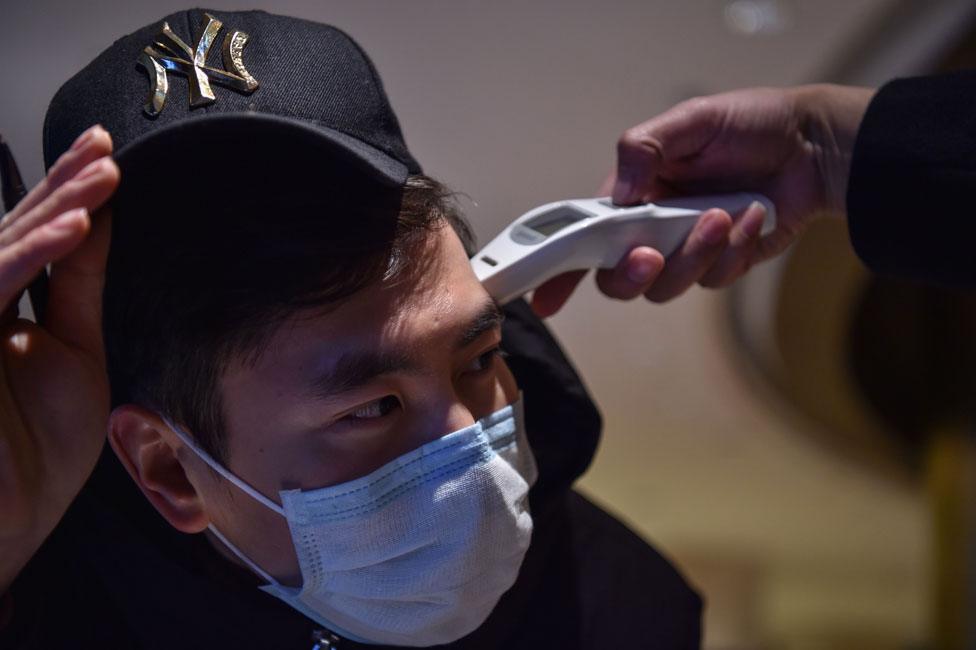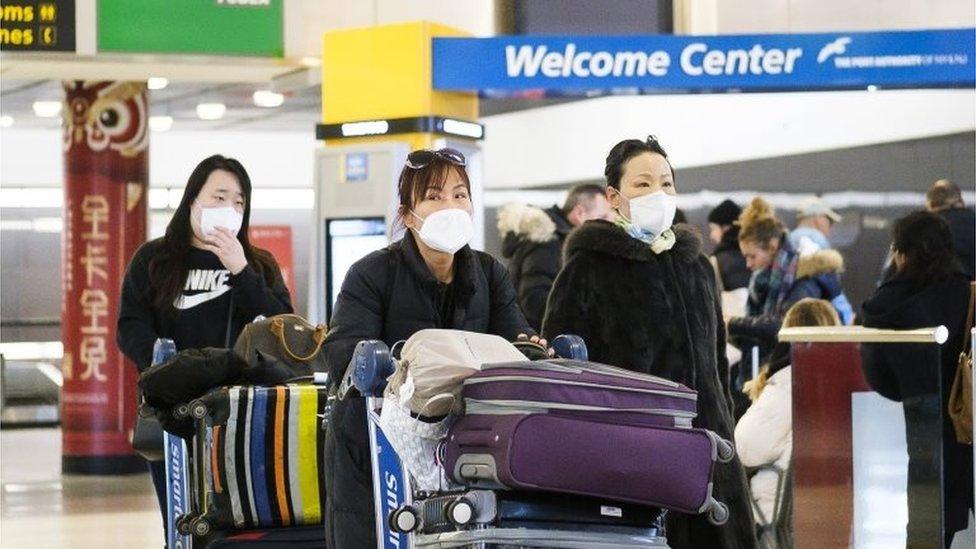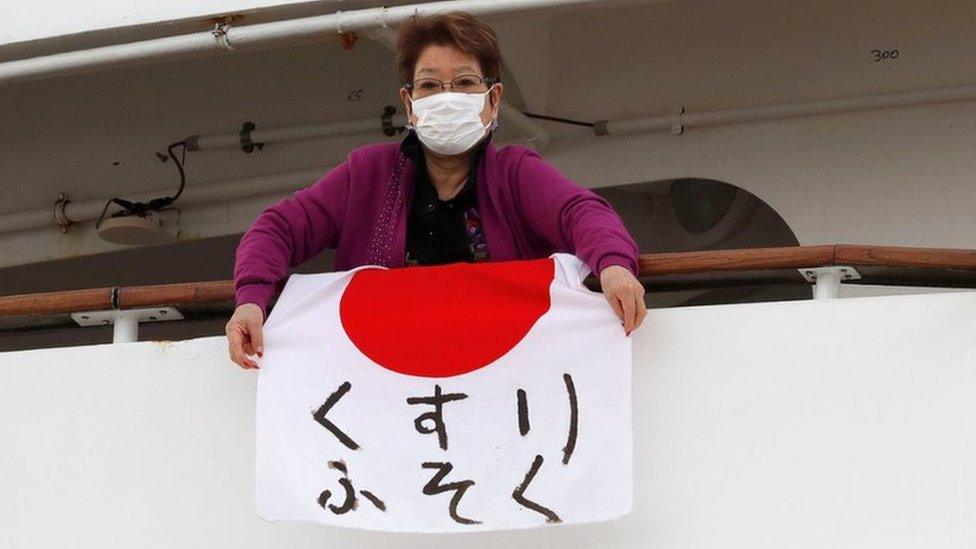Coronavirus: Your travel rights explained
- Published

Adam Cobb has been quoted £700 to re-route his flight
The coronavirus is now spreading well beyond China.
Travellers returning from nine Asian countries and destinations are being advised by Public Health England to avoid contact with other people if they show certain symptoms.
In addition to China, the Public Health England list includes Thailand, Taiwan, Japan, Hong Kong, Macau, Malaysia, Singapore and South Korea.
Holiday companies and airlines are still taking people to these countries, while insurers say travel policies are unlikely to cover cancellations - except to China.
Travel agents, tour operators and airlines are being contacted by anxious customers who are thinking of cancelling or re-routing journeys to avoid the places affected.
Adam Cobb, from Manchester, who was planning to fly to Hong Kong, has been told by his airline that he can get a free re-route or refund.
But his travel agent has quoted him a fee of £700 for a re-route to Singapore. "I'm at an impasse and have been passed from pillar to post without anyone helping me," he says.
So, what are your rights if you want to change your plans - or continue with them?
What happens if I travel to China now?
The Foreign & Commonwealth Office is advising against all but essential travel to mainland China and all travel to Hubei Province.
So if you travel against that advice and do manage to get there, you risk invalidating your insurance policy, though you may be able to argue that the trip is essential.
If you are there already, travel cover may not be valid in Hubei but should continue elsewhere in China - again, if your stay is essential.

The Diamond Princess cruise ship has been quarantined off Yokohama in Japan.
Can I have second thoughts about going to other countries?
Generally speaking, the travel industry is treating trips to these places, save for China itself and sometimes Hong Kong, as business as usual.
You can decide not to go to the places on Public Health England's list. But you are likely to be subject to the tour operator or airline's normal cancellation policies.
Likewise, you will be subject to the standard terms of your travel insurance.

What changes will travel insurance cover?
The key factor is the date that the Foreign Office started warning people against travelling to a country.
Insurers will cover cancellations from that point, as long as you have already tried and failed to get the airline or other provider to sort the problem out.
But how they help you varies from company to company.
"There is no cover in place to cancel a trip to an area where no advice against travel exists," says Daniel O'Byrne from one of the leading travel insurers, AXA UK.
AXA UK says you can claim if you are due to travel within the next 28 days. However, rival insurer InsureandGo will only take a claim within 48 hours of the planned departure, just in case the Foreign Office advice changes.
What about tour operators?
If you have bought a package holiday, the company should refund you the cost of your China trip, although they will have different rules on how far ahead they will allow you to cancel.
If China was only part of the holiday the provider can offer alternative holidays. But if there is a significant change to the original arrangements, you don't have to accept and can ask for a full refund instead.
Kuoni Travel told us it was reviewing the situation daily and was contacting people who have bought holidays in China up until the end of April to discuss their options.

Visitors wearing medical masks arrive at New York's JFK airport
British Airways will change or refund bookings to China and Hong Kong up until 29 February, while Virgin Atlantic flights to Shanghai are suspended until 29 March.
If Foreign Office advice changes will my insurance still cover me?
Yes, if you are in a country and while you are there the Foreign Office decides to advise against visiting except for essential travel, you should be able to make a "curtailment" claim on your policy. You would be able to claim for unused travel and accommodation and reasonable expenses for returning home.
What if I my air route involves a stop in an affected area?
You should ask the airline or tour operator to transfer you to an alternative route. If the airline or travel agent charges a fee to amend the flight then a travel insurance policy could come in handy because it may cover the extra charges or the overall cost of cancellation.
How are cruises being affected?
Cruise ships are refusing to take passengers who have passed through China, Hong Kong or Macau 14 days before embarkation. Some vessels are screening passengers for coronavirus when they come on board.
You are encouraged to check with the cruise line before travelling, just in case they have changed the itinerary to avoid ports considered to be riskier.
- Published7 February 2020

- Published5 July 2022

- Published9 March 2020
